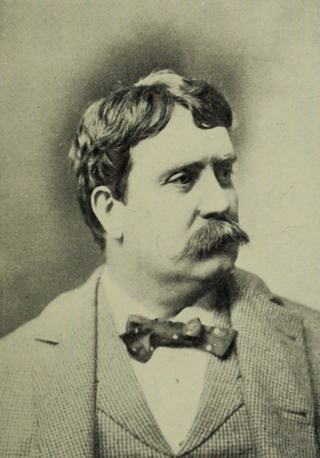
Daniel Hudson Burnham was an American architect and urban designer. A proponent of the Beaux-Arts movement, he may have been "the most successful power broker the American architectural profession has ever produced."

Joliet is a city in Will and Kendall counties in the U.S. state of Illinois, 35 miles (56 km) southwest of Chicago. It is the county seat of Will County. It had a population of 150,362 at the 2020 census, making it the third-most populous city in Illinois.
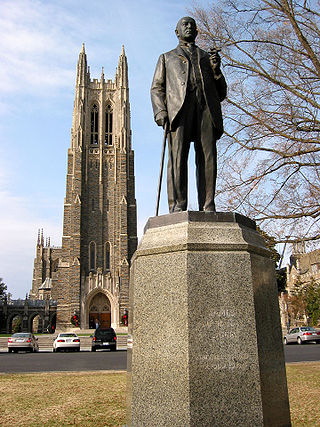
Charles Keck was an American sculptor from New York City, New York.

Dearborn Station was, beginning in the late 1800s, one of six intercity train stations serving downtown Chicago, Illinois. It remained in operation until May 1, 1971. Built in 1883, it is located at Dearborn and Polk Streets, to the south of the Loop, adjacent to Printers Row. The station was owned by the Chicago & Western Indiana Railroad, which itself was owned by the companies operating over its line. The station building headhouse now houses office, retail, and entertainment spaces, and its trackage yard, behind the headhouse, was redeveloped into part of the Dearborn Park neighborhood.
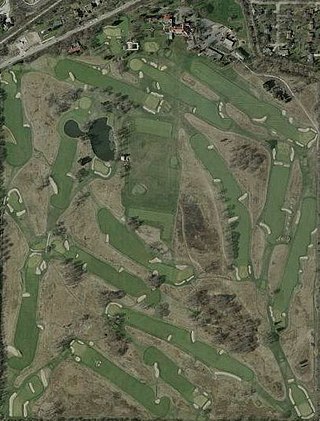
Chicago Golf Club is a private golf club in the Midwestern United States, located in Milton Township, near Wheaton, Illinois, a suburb west of Chicago. It is the second home of the club, the first being Belmont Golf Club in Downers Grove, Illinois, the site of the oldest 18 hole course in North America. It was one of the five founding clubs of the United States Golf Association (USGA) in 1894. The club was listed on the National Register of Historic Places in 2020.
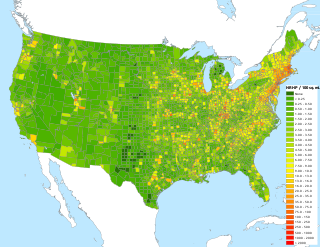
The National Register of Historic Places in the United States is a register including buildings, sites, structures, districts, and objects. The Register automatically includes all National Historic Landmarks as well as all historic areas administered by the U.S. National Park Service. Since its introduction in 1966, more than 97,000 separate listings have been added to the register.

The Alton Railroad was the final name of a railroad linking Chicago to Alton, Illinois; St. Louis, Missouri; and Kansas City, Missouri. Its predecessor, the Chicago and Alton Railroad, was purchased by the Baltimore and Ohio Railroad in 1931 and was controlled until 1942 when the Alton was released to the courts. On May 31, 1947, the Alton Railroad was merged into the Gulf, Mobile and Ohio Railroad. Jacob Bunn had been one of the founding reorganizers of the Chicago & Alton Railroad Company during the 1860s.

U.S. Route 66 was a United States Numbered Highway in Illinois that connected St. Louis, Missouri, and Chicago, Illinois. The historic Route 66, the Mother Road or Main Street of America, took long distance automobile travelers from Chicago to Southern California. The highway had previously been Illinois Route 4 and the road has now been largely replaced with Interstate 55 (I-55). Parts of the road still carry traffic and six separate portions of the roadbed have been listed on the National Register of Historic Places.

Joliet Union Station is an inactive Beaux-Arts train station in downtown Joliet, Illinois, built in 1912. Union Station was constructed as part of a large improvement project for the six railroads serving Joliet, which converged on the city as an important rail transportation hub just outside Chicago. At its peak, Union Station served over 100 intercity trains per day, with additional commuter and interurban service.
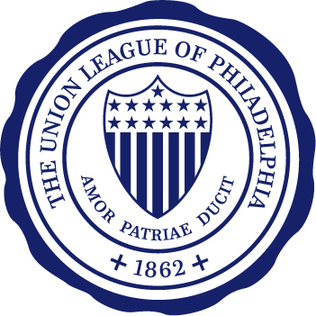
The Union League of Philadelphia is a private club founded in 1862 by the Old Philadelphians as a patriotic society to support the policies of Abraham Lincoln. As of 2022, the club has over 4,000 members. Its main building was built in 1865 and added to the National Register of Historic Places in 1979.

Clarence Wesley "Cap" Wigington (1883-1967) was an American architect who grew up in Omaha, Nebraska. After winning three first prizes in charcoal, pencil, and pen and ink at an art competition during the Trans-Mississippi Exposition in 1899, Wigington went on to become a renowned architect across the Midwestern United States, at a time when African-American architects were few. Wigington was the nation's first black municipal architect, serving 34 years as senior designer for the City of Saint Paul, Minnesota's architectural office when the city had an ambitious building program. Sixty of his buildings still stand in St. Paul, with several recognized on the National Register of Historic Places. Wigington's architectural legacy is one of the most significant bodies of work by an African-American architect.

Starrett & van Vleck was an American architectural firm based in New York City which specialized in the design of department stores, primarily in the early 20th century. It was active from 1908 until at least the late 1950s.

John Lawrence Mauran, FAIA (1866–1933) was an American architect responsible for many downtown landmarks in St. Louis, Missouri. He was also active in Wisconsin and Texas.

Kansas City Union Station is a union station that opened in 1914, serving Kansas City, Missouri, and the surrounding metropolitan area. It replaced a small Union Depot built in 1878. Union Station served a peak annual traffic of more than 670,000 passengers in 1945 at the end of World War II, but traffic quickly declined in the 1950s, and the station was closed in 1985.
William Carbys Zimmerman (1856–1932) was an American architect. He was the Illinois State Architect from 1905 to 1915, designing many state-funded buildings, especially at the University of Illinois. He was a partner of Flanders & Zimmerman.
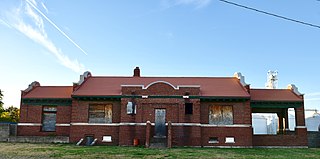
Chicago and Alton Depot, also known as the Illinois Central Gulf Depot, is a historic train station located at Marshall, Missouri, United States, that is listed on the National Register of Historic Places.

Daniel Hudson Burnham Jr. (1886–1961), was an architect and urban planner based in Chicago and one of the sons of the renowned architect and urban planner Daniel H. Burnham. Burnham Jr. was director of public works for the Century of Progress 1933-34 World's Fair in Chicago, the same role his father held for the World's Columbian Exposition of 1893.

John Keys Winchell was an architect in Chicago who worked on buildings in Nebraska's then newly designated capitol of Lincoln. He designed the state's first insane asylum. He also designed the Thomas P. Kennard House for the state's first secretary of state and Butler Mansion for Nebraska Governor David Butler in Lincoln, Nebraska.
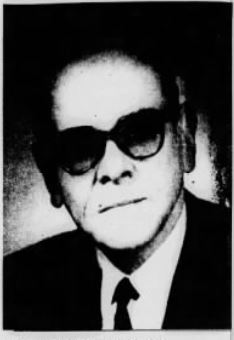
Leon Bishop Senter was an American architect who worked primarily in Oklahoma. Although not formally educated in architecture, he became Oklahoma's first licensed architect in 1925 and designed several buildings on the National Register of Historic Places.



























